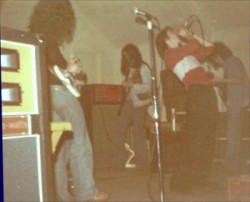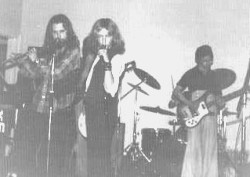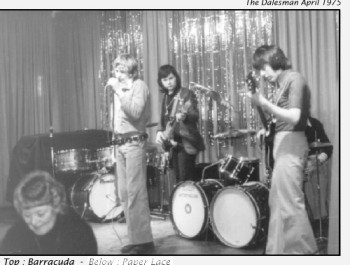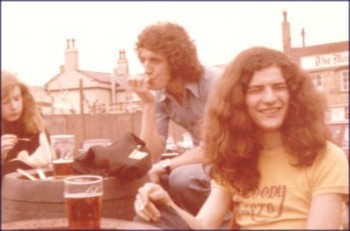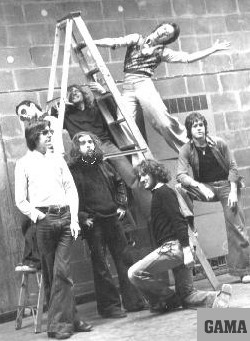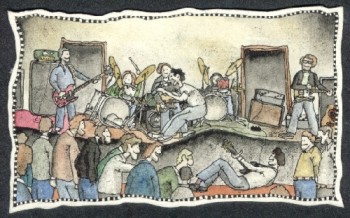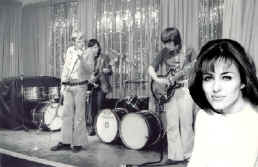The Story of The Wharfe Beat Sound
This is a potted history of the movement from it's humble beginnings to it's ignominious decline - and who's any the worse for it's passing?
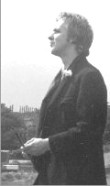
In the dismal days of 1973
there was a duet of school chums who formed a beat combo and called it Scapegoat.
These chums, Dave Knight and David Jamus-Umpleby released one derivative
album of tribal chants on the Caveman Record Label. It sank without
trace and is now a rarity which can sell at Collectors' Fairs for
upwards of £500. That is not to say that it ever has.....but it might -
and that's the point.
In the Crypt Youth Club in Old Wath Town, Tuesday was the regular
rehearsal night for a Heavy Rock Four-Piece called Max
Quad. The Quad comprised Stevan Alcock (an outrageous tone-deaf
drag act) on vocals, Steven Taylor on drums (red ones) Stephen Knight (major) on
electric guitar and the legendary Bluesman "Mad" Martin
O'Flaherty (left) on bass. In time the two-man Scapegoat plus Knight
(major) and O'Flaherty joined forces in the new-look Scapegoat.
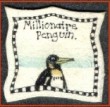
Another band on the Wath circuit at that time was the splendidly named Millionaire Penguin. After an initial period in which they experimented with folk rock, Penguin transformed into a New York Punk band, modelling themselves on the Velvet Underground, although they did not have a stoned German woman moaning in the background. They did, however, have Phil Robertson in the line-up. Robertson was an eccentric Scot whose main claim to fame had been to revolve a gourd in the window of the art block at Wath High School. Knight (major) and Robertson were on nodding terms only at this time.
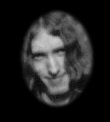
By the Summer of 1975 Scapegoat were no more. The Bluesman had moved on to the Harrogate scene where he was establishing a reputation as a legendary bass player, and the three remaining members had been joined by former Asghard man John "Genesis" Carter-Hackett on guitar and Jeff "Keyboard" Duke-Ellington in Buffoon. With the later addition of Lady Antonia Patterson on 'cello, this band established itself as the most high-falutin' of all the Wathbeat groups with a sound which extended to 'cello, flute, recorders and, of course, combs with tissue paper. Sir John Staplechin, in an interview with the London Times: "Lady Antonia (was) rendered cello-less by an incident involving a bridge to a loft rehearsal room and a rather long drop. I remember the 'cello in several bits. If my recollection is correct I believe this marked the end of Buffoon's attempts at complex orchestration."
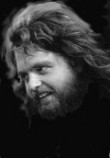
In 1976 Knight (left) met Dave Atha at the Leeds College of Art during a one year Dossing Course. Atha was a drinking man's guitarist and his arrival on the scene signalled the beginning of the end of the Wathbeat sound - Atha hailed from Leeds and had drifted in and out of a variety of bands. By this time Knight (major) and Robertson were on well established speaking terms and it was only a matter of days before a new combo was being put together. This was Vasco da Gama. The line-up now consisted of Knight (major) and (minor), Robertson, Umpleby and Atha. Umpleby quit to go professional and was replaced by a school chum of Atha's, Dave "Sticks" Hodgson. With the introduction of Phil Hitchen (an Art College mate of Robertson's) on keyboards, and his brother Simon on bass, the group's identity was nearing completion. It only remained for Saul "Frasher" Kaye to be brought in, and the jigsaw was complete. Unfortunately Kaye was from the wrong jigsaw - he was relegated to the role of sound and lighting engineer and then dumped. Several years later he was arrested and convicted of lewd and incandescent behaviour in a ladies lavatory.
Vasco da Gama
had both feet firmly in the Progressive Rock camp during those early days but as the personnel diversified this became less apparent, with musical differences bubbling under the surface. The band were pulled in several musical directions with forays into space-rock, folk and vaudeville. It was clear that something would have to give. The Hitchens had brought a keyboard based outlook - the rest were more guitar-orientated with the exception of Dave Knight who was a devotee of the descant recorder. It was Hitchen Major's insistence that Gama should pursue his organ-based sound that caused Knight (minor), the main creative song-writing talent in the group, to attack him with one of his descants. The descant was undamaged as scuffles broke out - the band had crossed that bridge and had burnt it and there was no going back. Against a backdrop of lawsuits, counter claims and legal wranglings the final act was played out as Vasco da Gama ground to a halt.....Millionaire Penguin
were born when Warren Jung and P.F. Robertson started making noises with a cheap bass and a home-made electric guitar. Phil Robertson recalls : "with the advent of a reel to reel, Stylophone and a cassette recorder (and a real musician in the shape of Colin Young) we became a bit more capable. Having only acoustic guitars we found ourselves going folky. Jam sessions with Graham "Drydale" Drid on mandolin, Michael Bantick on bass and Russ Holden on vocals/harmonium were arranged. We set about learning songs by the then popular Steeleye Span, Eagles and Lindisfarne. I had acquired a five-string banjo and was failing to come to terms with it."One evening during rehearsals chez Drydale, an old plastic 'Beatles' snare was unearthed and together with the banjo skin a makeshift drum kit was assembled. This chance find nudged the penguins away from their folky inclinations and set them on course for a new musical directions - one that required mains electricity. The next stage in the development of the band can be blamed on Gordon Whitelock, elder brother of the infamous Dan Deadnettle.
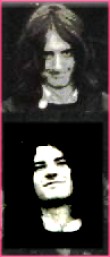
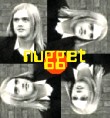
Gor White was lead singer and kazoo player
with Collingham supergroup Bloody Fasto,
which also featured Tacker Jule on guitar, Ginger Turner on drums, Tav
"Ian" MacBride on rhythm and the excruciating James
"Bighead" Gaffney on bass. (White and Jule were the
masterminds behind the 1972 Aqualung songbook heist but that's a
side-issue and need not detain us here). The Fasto
had arranged a gig with Greasy Dunc and the Dagoes
and another band from Harrogate who were well equipped and who had
agreed to let anyone else use their gear for a gig at Bardsey Village
Hall. It was at Gor's insistence that Penguin were added to the bill
"So there we were - acoustic, three Lindisfarne songs under our
belt and two weeks to the date. We set about learning some Eno and Roxy
Music songs, things we could do in the time allowed. Unfortunately I had
to grovel to Professor Goldie Nugget Nug
to borrow his 'Top Twenty' electric guitar on an ad hoc
basis. I think he was trying to wangle his way into my position in the
band but we stood firm. He had the axe and a pretend American accent but
I had the talent and Russ had the name (from a cartoon strip which
cropped up in his rough book at school)"
The Penguin stole the show and realised that perhaps they could make a
decent living out of playing this homespun brand of Blues Folk Rock
Jazz, a fusion which had never been fused so bizarrely. Phil Robertson
traded in his green shield stamps and bought a 12 string and swapped the
banjo for a Fender Telecaster copy. Russ Holden got a P. A . and brought
along his mate Paul Vure from Park Lane on yet another guitar "(and
a bloody good Marshall amp/stack for the bass)".
Penguin began to gather a reputation on the Wath circuit but played only occasional concerts during the next two years, fearing that over-exposure might prove detrimental - they had already witnessed the staggering decline in the critical standing of bands like The Dave Norman Social Club Band, which many commentators believed was the result of over familiarity with a limited repertoire (House of the Rising Sun, Alright Now and the Clive Dunn standard "Grandad")
If printed black T shirts had been available at the time the back may have looked a bit like this:-
- 75 Bardsey Village Hall
- 75 Linton Village Hall
- 75 Janice Shinkins' 18th at Wetherby Borstal Concert Hall
- 75 Tockwith Village Hall
- 75 Wetherby Town Hall
- 75 Royal Oak Knaresborough (twice)
- 75 Crown, Boston Spa
- 76 Park Lane College (actually an audition)
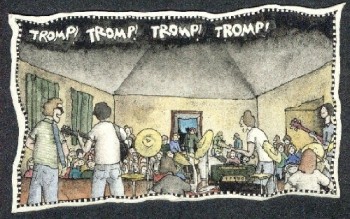
Robertson : "Colin was a
phenomenal guitarist, grade 8 classical at 12, and could actually find
the time to be in two bands, the other being Barracuda
with his mates Pete Honeyman, Steve Kay, Derek Kay (no relation) and
Ivor Waterhouse.
We got 'rolled and bunned' off stage at the Shinkins
Shindig, refusing to play "Smoke on the Water'. I went home but the
others stayed and played a successful second half which was a bit of a
bastard, as far as I was concerned.
Best shows were Linton for the laughs (but not for Byrom and the
fire-hose), Tockwith where Colin Young leapt off stage during 'Remake,
Remodel' and the second Crown date with Russ and Gor White's mock fight
during 'Heartbreak Hotel'."
The split was inevitable and finally happened in early 1976 due to musical differences and various levels of competence...Phil Robertson resurfaced as Sam Granite and most of the Penguins went on to become Big Dogs...but that's another tale..
